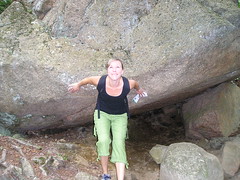What a great idea for Middle or High Schools. A class that teaches students what will be needed of them in the 21st Century. This is what we need.
A post by David Warlick made me actually think about these possibilities. I wonder if this possibility has even been considered in my district. It seems as though an investigation will have to be done. If their is a way... I want to be involved. Many ideas are floating around in my head.
Wednesday, February 6, 2008
21st Century Skills Class
Monday, January 14, 2008
"Help Make The Network Real"
Add to the wiki. Will Richardson, Karl Fisch, and Anne Smith will be presenting outside of Philadelphia tomorrow at "21st Century Education:20/20 Vision for Schools". Planning on making it a global event and proving their point, they have created a wiki for us to add our info too. Good luck Will, Karl and Anne. Hopefully you will make some new friends:)
Thursday, December 27, 2007
Regulation without Education
Reading through my aggregator last night, I was pleased to see a new post in added in one of my favorite blogs as of late. Students 2.0 has a unique perspective being from students across the globe writing for education reform. Sean "The Bass Player" ...
Sean talking of the Queen's Christmas broadcast being posted on YouTube. The comments are taking a great turn. This is a conversation that needs to happen between students and teachers. Some educators get it and some don't. The ultimate problem will not be solved by issuing a regulation or a law against this Internet content. Of course some students, if given the opportunity, will find inappropriate videos/pictures/content. The problem lies with teachers and students. Irresponsible teachers and students should be punished.To me, this begs the question: if someone of such a high stature can adapt with the times, and incorporate the technologies found around us in to something that has done its job over the past 50 years then why do these technologies not have a place in our classrooms right now? Why are the schools the only places left that don’t seem to want to adapt?
Many problems in our society have been bandaged by making a quick law that makes the action illegal without solving the actual problem... (guns, drugs, immigration). Make the gun illegal, there becomes a black market = more crime. Make the drug illegal, there becomes a black market = more crime. You "should" get the point. It is surprising to me that some people just don't get it. When something becomes illegal it also becomes glorified.
Back to the point of the post...
There are some interesting videos that I wish I could share with my students. These videos just happen to be posted on a site that is blocked by my district. Why not let teacher discretion decide what is appropriate for our students? Oh that's right, we are not trusted to make decisions. This is why all the decisions are made for us. This is sad. It also sounds a little like the relationship between teacher and student in our schools. We don't trust them, so we create most of the work for them... they just need to fill in the blanks.
The theme of a nation...
This happens in all aspects of our society. To name a few... (seat belt laws, helmet laws, food labels, drug laws, gun laws) These laws are created because the government does not trust "us" to make the right decision. They create a law and say "we did our job, you can't blame us".
Saturday, August 25, 2007
Hacking into the iphone
I woke up this morning to the news of an iPhone hacker on the local news. Supposedly, he spent over 500 hours working on this project in which he had to use a soldering iron to disassemble the iPhone. His point was to make the iPhone available to other cell service providers. His question...Why should AT&T get sole use of this technology?
This era of techno-relevance is mind boggling to say the least. To think...there are teenagers out there that are self-taught prodigies when it comes to the intricacies of these tech tools. This mere 17 year old decided to use his skills to hack into the newest gadget on the market. These types of ideas happen every day I am sure, but this is national news now. It took him the same amount of time that it took 5 trained hacks to do the same thing to the iphone.
Does this 17 year old need college?
Tuesday, August 21, 2007
What needs to be asked
Today we spent about 4 hours discussing the order (pacing) in which these indicators will be taught this year.
My point:
What did we do?
The wrong questions were being asked at this meeting. We spent the valuable time arguing/explaining the reasons why certain teachers wanted certain indicators to be taught at certain times. Most of the time was spent with teachers complaining about their situations, complaining about students and how they forget everything that is taught to them, and complaining about other teachers. At the end of this meeting, we figured out the first quarters pacing and have an idea of what the remainder of the year is going to look like regarding curriculum.
What should we have done?
We should have discussed how(the processes involved) to teach these children. This is a realm that is not addressed anymore, it seems.
We are going to continue to have students that can't remember taught curriculum, struggle to learn, and fall short on processing skills if we don't address HOW to teach. This involves the activities and the processes that we require our students to take part in.
Monday, August 6, 2007
Are we still living in the past?
Monday, July 30, 2007
Lead Pencil Club
I'm still truckin along, on my last legs of this East Coast trip. I am in Franconia, New Hampshire, deep in the White Mountain Region. I have yet to stay at a place that doesn't offer a free wireless connection. Unbelievable if you ask me. Well, in Boston, we had a wireless connection, but nothing was free. I am out in the middle of nowhere, I look around, all I see is mountains, and I have a wireless connection. I love it.
List of the cities in which I have been
Philadelphia, Pa
Princeton, NJ
New York
Providence, RI
Pawtucket, RI
Plymouth, Mass
Boston, Mass
Salem, Mass
Ogunquit, Me
Bar Harbor, Me
Kennebunkport, Me
Deer Isle, Me
Franconia, NH
Today, we are off to Vermont to stay for 2 days, New York for 1, and Pennsylvania for 1. Then home sweet home.
I have decided not to add any more photos to Flickr until I get back to the home front. It was taking entirely too much time to upload the pictures.
Great conversations in Blogworld. I have been keeping up with them on my journey's. I haven't had a lot of time to blog and comment on other blogs, but I plan to dive in when I get home. I am in the middle of reading a book by the Lead Pencil Club. Very interesting to hear the other side of the Internet debate. The cool thing is that I can argue almost every point they try to make. More to come about this book...
Saturday, July 7, 2007
My students won't be left behind
In August, when I begin teaching my new class, I am planning on changing the face of the education model in our county. I will follow the curriculum, but plan to go out on a limb when it comes to the process in which we learn that curriculum. Tech literacies will be integrated into the big picture.
I have already contacted a few individuals in our district regarding tech grants. I want each of my students to have access to their own laptop, ipod, and digital media recorder. This is my goal. I figure that, I can do what I can for my class. After I get what I want for my class, I will work on getting it for the school. After that, I will continue to urge the remainder of school system to jump on board.
Thursday, July 5, 2007
Computers for every child
Responding to David Warlick's blog http://davidwarlick.com/2cents , I am not quite sure he is looking at the whole picture. Many of the ed-tech pioneers have spent a little too much time in their cozy computer filled world. Don't get me wrong, I agree with most of the messages they bring to the table. It has been my experience that we need to first get all students connected at home and in the classroom before we can concentrate on students consistently learning these new literacy's.
The whole picture:
Most school districts do not have 1:1 students to computers. I do not know where this fact came from. I know that the school I teach in has 975 students and about 200 computers. Our school district is one of the most advanced in the nation when it comes to technology. We have partnered with Cisco to pilot many new technologies in our schools... IP phones, wireless Internet, CPS Clickers, and many other software improvements. Every teacher in our district has an IP phone. I would say 99% of them do not know how to use the tools on the phone, they just call people with it. About 1 % of our teachers actually use the CPS Clickers with their students. Improving this comes first in the big picture. How can you expect your students to learn new tech literacy's when they do not have the vehicle to do so. We need computers first and foremost.
I agree with David Warlick and his ideas about using computers as a vehicle to new literacy's in our schools. We have to have computers first.
Friday, June 29, 2007
Looking Forward to the Classroom
I am looking forward to getting back into the classroom. I have many new and untapped plans that I look forward to implementing with the students. My focus will be on changing the model for teaching in the public education system. I believe there are many ways to do this while sticking to the redundant, boring curriculum that we have to teach. Who knows, maybe in the future we will have the opportunity to rewrite the curriculum so that the focus is not on standardized tests. Almost sounds too good to be true. I look forward to showing students new ways to learn and use information. I also plan on focusing on new literacies instead of the old literacies that are used presently. Blogs, podcasts, vodcasts, screencasts, ipods, smart phones, skypes, and wiki's are the new ways information is being shared. Who knows, in a few years there may be a thousand other tools for students to use. I am looking forward to this stuff.



